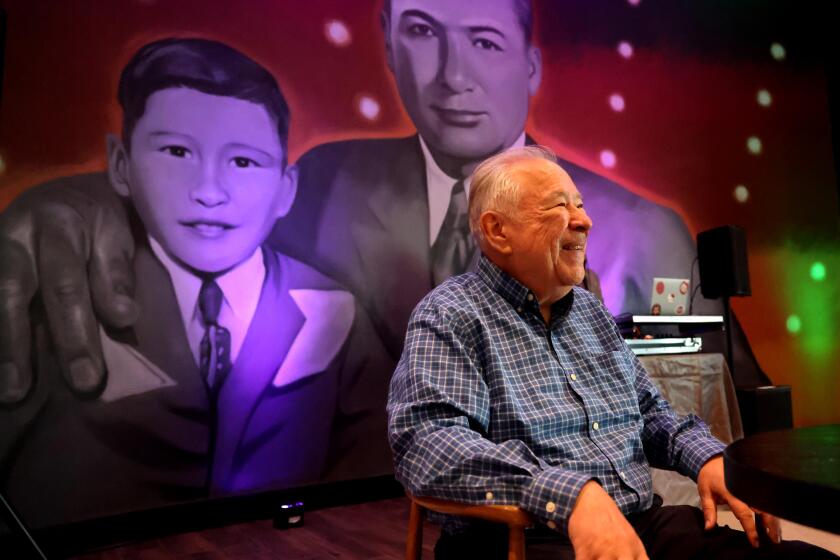Mamet Stays Faithful to Still-Topical âWinslow Boyâ
David Mamet has raised profanity to an art form in many of his plays, but donât think his tastes are profane. Mamet did the adaptation of Chekovâs âUncle Vanyaâ that ended up as âVanya on 42nd Street,â and, says his wife, actress Rebecca Pidgeon, heâs fond of playing Victorian songs on the piano. So there.
Still, itâs a bit of a surprise to find that Mametâs sixth film as a director, âThe Winslow Boy,â is a remarkably faithful adaptation of a half-century-old theatrical warhorse by Terence Rattigan (âThe Browning Versionâ), the master of the well-made British play. Set in England just before the Great War, when men still dressed for dinner and grumbled about old cricket injuries, itâs an unlooked-for venture into Merchant Ivory country for Mamet, but not any less welcome for that.
While the writer-director must have been bemused at being associated with a G-rated venture in which âwhat utter rotâ is the strongest imprecation going, Mamet has not taken âThe Winslow Boyâ on because of some misguided reverence for the theatrical past.
Rather Mamet has recognized the dramatic tension still inherent in the original. And, though it was previously filmed more than 50 years ago, heâs seen how relevant to the issues of the day the playâs managed to remain. For âThe Winslow Boy,â a pointed examination of the price of seeking justice, also deals with concepts like the power of the media and private rights versus the public good and raises issues whose echoes are as up-to-the-minute as the impeachment imbroglio.
The Winslow family seems the unlikeliest incubator for such a fuss in 1912âs England. Father Arthur (Nigel Hawthorne) is a banker so proper he grouses at older son Dickie (Matthew Pidgeon, Rebeccaâs brother), a wastrel-in-training at Oxford, that a gramophone is out of place in a civilized home.
Most of the obvious spunk in the family resides in daughter Catherine (Rebecca Pidgeon). Though the piece opens with her about to be officially engaged to military man John Watherstone (Aden Gillett), Catherine is a committed suffragist and is sympathetic to trade-union radicals as well.
Fourteen-year-old Ronnie (Guy Edwards) is nominally away at school, but he shows up unexpectedly with a letter announcing heâs been summarily dismissed from the Royal Naval College at Osborne, accused of stealing a five-shilling postal order. After a stern examination (âIf you tell me a lie, I shall know it, because a lie between you and me canât be hiddenâ), Arthur accepts his sonâs protestations of innocence and embarks on a campaign to get him a proper trial.
Because of the complexities of British law and tradition, this is a tricky business to pull off, and Arthur, in addition to using the media to further his cause, asks family lawyer Desmond Curry (Colin Stinton) for help in seeking the services of Britainâs top solicitor, Sir Robert Morton (Jeremy Northam).
A model of icy decorum, Sir Robert is suavity itself, but Catherine thinks he is too heartless for a case like this. Catherine is also disturbed by Sir Robertâs establishment views: âHe always speaks out against what is right,â she says, not a little angry.
One of the main thrusts of âThe Winslow Boyâ is the terrible human costs of this attempt to do the right thing, the life-changing stresses borne by wife and mother Grace (Gemma Jones) and by each member of the family. When Arthur asks his daughter at one point, âKate, are we both mad, you and I?,â itâs a much more difficult question to answer than anyone anticipated.
Playwright Rattigan based âThe Winslow Boyâ on a celebrated real case, though he moved the date up from 1912 to put his story under the shadow of World War I, and he made the familyâs conservative older sister into a suffragist. As for the changes Mamet made in Rattiganâs work, they are surprisingly few, the main one being the expected one of opening the play from its exclusive setting in the Winslowsâ Kensington drawing room.
Quite a precise writer on his own turf, Mamet has warmed to that aspect of Rattigan and gotten consistently good performances from his well-cast actors. Hawthorne, Oscar-nominated for his role in âThe Madness of King George,â brings a humanity and a caring to his role that âWinslowâ would be lost without. The theater-trained Northam is ideal as the exacting Sir Robert, and Rebecca Pidgeon deftly handles the slight hint of a flirtation between her and the solicitor that the play doesnât have.
Genteel moviemaking with modern overtones, âThe Winslow Boyâ is especially good at the visual re-creation of its time. Production designer Gemma Jackson and Mamet clearly had a great deal of fun creating so many Winslow-mania objects, from pins to umbrellas to political cartoons, that the case seems as real, and as much of a public furor, as the O.J. Simpson trial.
And when people say that the Winslow case was terrible for the country but also a good thing because âit could only happen in England,â statements made during President Clintonâs impeachment trial come immediately to mind. There is a difference, Sir Robert says in the play, between doing justice and doing right, and their joint understanding of this is where Terence Rattigan and David Mamet, nominally so different, have no difficulty joining hands.
* MPAA rating: G. Times guidelines: Itâs all extremely genteel.
âThe Winslow Boyâ
Nigel Hawthorne: Arthur Winslow
Jeremy Northam: Sir Robert Morton
Rebecca Pidgeon: Catherine Winslow
Gemma Jones: Grace Winslow
Guy Edwards: Ronnie Winslow
Matthew Pidgeon: Dickie Winslow
Released by Sony Pictures Classics. Director David Mamet. Producer Sarah Green. Screenplay David Mamet, based on the play by Terence Rattigan. Cinematographer Benoit Delhomme. Editor Barbara Tulliver. Costumes Consolata Boyle. Music Alaric Jans. Production design Gemma Jackson. Art director Andrew Munro. Set decorator Trisha Edwards. Running time: 1 hour, 50 minutes.
Playing in selected theaters.
More to Read
Only good movies
Get the Indie Focus newsletter, Mark Olsen's weekly guide to the world of cinema.
You may occasionally receive promotional content from the Los Angeles Times.











